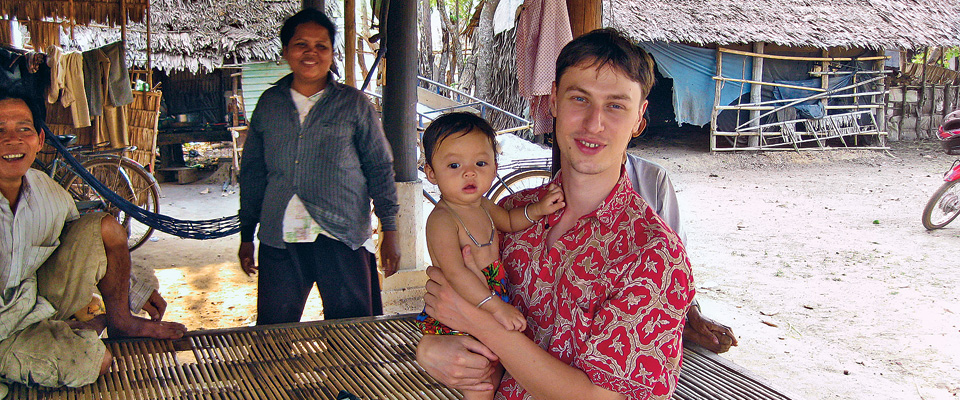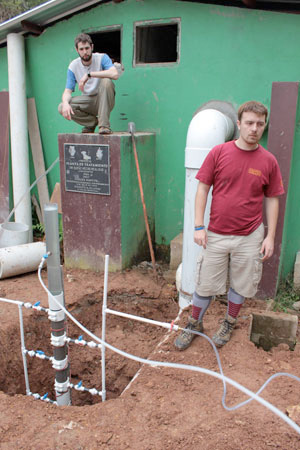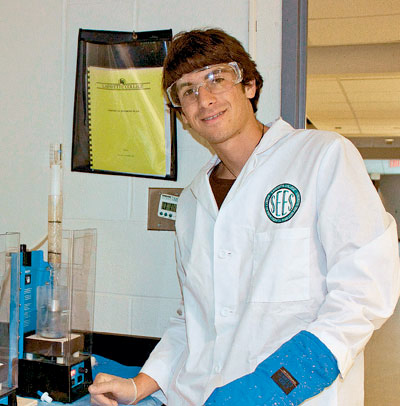Udall Winners Thrive

Hart Feuer ’05 in Kompong Chhnang Province, Cambodia. “Sustainable agriculture in Cambodia could become the norm. And that is something worth studying, worth learning from.”
Brian Peacock ’12, Lafayette’s latest recipient of a Udall Scholarship, is in great company. That goes for the national landscape — the Morris K. Udall and Stewart L. Udall Foundation awards only about 80 of the scholarships each year. It also goes for Lafayette, where Peacock has added his name to a list of environmental activists who are dedicated to making the world a better place, the College’s previous Udall recipients, Mickey Adelman ’10, Ben Towne ’09, Gabriella Engelhart Farnham ’05, and Hart Feuer ’05.
The scholarships go to college sophomores and juniors who are committed to careers related to the environment, tribal public policy, or Native American health care. A civil engineering major who is headed for advanced study in the emerging field of ecological engineering, Peacock collaborated with Art Kney, associate professor of civil and environmental engineering, in research on constructed wetland systems that was presented at the American Society of Civil Engineers’ 2010 World Environmental and Water Resources Congress. Last spring, during a semester in New Zealand, Peacock helped develop a tool that integrates hydrological, ecological, economic, social, and other considerations to improve decision-making about the placement of riparian buffers, or green zones along streams, rivers, and lakes. He coauthored an article on the work with Dan Hikuroa, manager of the Community Earth Systems Science Program at the University of Auckland, for Ecological Engineering: The Journal of Ecosystem Restoration.
This spring, Peacock also was awarded a Greater Research Opportunity Fellowship by the U.S. Environmental Protection Agency, which provides a summer internship at an EPA facility in addition to tuition assistance and a stipend during the school year. “It has been great to work closely with professors and have the freedom to explore my own ideas,” he says. “The research facilities here are outstanding, and the school’s size has enabled me to access all of the facilities with unprecedented ease.”
CLEAN WATER
Mickey Adelman, who also majored in civil engineering at Lafayette, is pursuing an M.S. in environmental processes in the Department of Civil and Environmental Engineering at Cornell University. He’s working as a research assistant with the multi-disciplinary AguaClara group, which designs sustainable water-treatment systems suitable for resource-poor communities.

Mickey Adelman ’10 (left) testing innovative water-filtration technology in Marcala, Honduras. “Our direct applications are in the developing world, but good science in this area is important here in the United States as well.”
“My undergrad research experience at Lafayette allowed me to work in a few different areas of this research,” says Adelman, a two-time Udall Scholarship recipient who wrote an honors thesis on nitrogen management in municipal-waste composting under Kney’s direction. Adelman was a key contributor to the campus organic gardening, composting, and food-loop initiatives (see “Earth Day Every Day” in this issue). His work off campus included designing and implementing sustainable water and sanitation systems in the Honduran villages of Lagunitas, La Fortuna, and El Convento, as part of Lafayette’s Engineers Without Borders team. Through the Economic Empowerment and Global Learning Project, he helped the villagers in Lagunitas create a sustainable economy by establishing a coffee plantation.
That’s just some of the impact that Adelman, who won the Pepper Prize, had as a Lafayette student. The main focus of his research now is stacked rapid-sand filtration, an innovative approach to rapid-sand filtration that avoids pumps and other expensive equipment required to backwash conventional filters.
In January, his team did the first field demonstration of the stacked-filter technology using a small unit in Marcala, Honduras, where an AguaClara-designed water-treatment plant is located. “We diverted a portion of the plant flow and sent it through the stacked filter, and the water coming out met U.S. EPA standards for drinking-water quality,” he says. His team had similar success with the demo unit at other treatment plants as well. He’ll be back in Honduras this summer to build a full-scale stacked rapid-sand filter, the first of its kind.
“We have several live projects in Central America with many more in the pipeline, possibly as far away as Ethiopia,” Adelman says. “Our direct applications are in the developing world, but good science in this area is important here in the United States as well. There are major investments needed over the next few decades in our nation’s water infrastructure, and efficient solutions will help us meet these needs.”
INFORMING THE DEBATE
At Carnegie Mellon University, Ben Towne is researching design principles for systems that can help large, distributed groups of people effectively tap the knowledge that they and their partners have in order to help make more informed policy decisions. This spring, he finished his second year of studies in the Ph.D. program in Computation, Organizations, and Society in the School of Computer Science.
“Every day, policymakers in many contexts are called on to make myriad decisions across a broad spectrum of topic areas, each of which has both near- and far-reaching consequences,” Towne explains. “In many cases, it is not possible for each policymaker to know all the consequences of his or her decisions, due to finite limits in time and resources, even if the knowledge is present within the legislator’s constituency. Individuals often have valuable knowledge they can contribute in one or a small number of subject areas, even if they avoid seeking out policymaking positions due to responsibilities in other areas. Existing work shows that individuals are also willing to share their knowledge and expertise under certain conditions. This is evidenced by initiatives like Wikipedia, open-source projects, and millions of online discussion boards where experience and advice are exchanged every day.”
At Lafayette, Towne majored in electrical and computer engineering and added a second, self-designed major in community development. A four-year member of the College’s Sustainability Committee, he was a founding member and president of the TREEhouse floor, an environmentally oriented special-interest living group, and pioneered the annual distribution of compact fluorescent light bulbs in residence halls.

Brian Peacock ’12
Another of his current research interests, the link between technological development and social change, began at Lafayette. As a senior, he was one of five winners worldwide in a student contest sponsored by the International Telecommunications Union’s World Telecommunication Policy Forum. Contestants submitted short videos describing their vision for the future of information and communication technologies. Titled “Building Sustainable Communities Through the Development of Technology that Enhances Value in Life Experience,” Towne’s entry proposed that technology designers and policymakers consider how telecommunications tools can facilitate strong bonds, such as those in families, alongside those technologies that can make teams at all levels more effective.
Towne drew on an independent study he performed under the guidance of Gladstone Fluney Hutchinson, associate professor of economics, in New Orleans as part of the Economic Empowerment and Global Learning Project. Towne’s work in New Orleans focused on the roles that information and communication technologies might play in the redevelopment of the Lower Ninth Ward, which was devastated by Hurricane Katrina. He also drew on his experience studying engineering and German language and culture in Lafayette’s faculty-led semester at Jacobs University Bremen.
“Individuals on average have more personal freedom but less sense of a deep connection to any particular group,” he says. “These changes have been going on since at least the birth of cities, even if the shift has accelerated lately. Some of these changes are for the better, others maybe not so much. There is little understanding of how any particular new technology, real or theoretical, will change social structures and alter our society.”
In January, Towne and colleagues in Carnegie Mellon’s biomedical engineering program and the University of Pittsburgh’s nursing school authored a proposal for a novel technology to facilitate communication for older adults through video chat that was awarded the top prize in the inaugural Innovator’s Challenge competition sponsored by IACT (Industry Academics Clinicians Together), which was founded last year to create workshops, competitions, and related events to catalyze collaboration among businesses, researchers, and physicians in Pittsburgh.
THE BEST SCIENCE POSSIBLE
Gabi Engelhart Farnham completed her Ph.D. in chemical engineering at Carnegie Mellon last May and is an associate engineer at ConocoPhillips Research and Development in Bartlesville, Okla.
At Lafayette, she wrote an honors thesis on nanomaterials under the direction of James Ferri, associate professor of chemical and biomolecular engineering. She spent two weeks conducting research with Ferri at the Max Planck Institute for Colloids and Interface Science in Golm-Potsdam, Germany. She also researched ways of removing color from the wastewater discharge of pulp from paper mills with Javad Tavakoli, professor of chemical and biomolecular engineering.
“Her efforts have been equal to any graduate student’s work,” Tavakoli said at the time. “She is very systematic and very focused. You don’t come across someone as good as she is at so young an age very often.” On Tavakoli’s recommendation, Farnham participated in the Semester in Environmental Science program at the Marine Biological Laboratory in Woods Hole, Mass. Only a sophomore, she studied aquatic and terrestrial ecosystems and completed independent research on methods of removing nitrogen from water.
“It was a great experience. The program was first-rate. We had the opportunity to conduct a great deal of hands-on research and worked and talked with distinguished scientists from around the world,” she says.
At CMU’s Center for Atmospheric Particle Studies, Farnham’s focus was cloud-condensation nuclei, particles that activate to form cloud droplets. The research involved laboratory measurements in environmental smog chambers as well as ambient field measurements in Greece and France. At ConocoPhillips, she’s in the Water and Air Group in the Sustainability Technologies Division.
“I’m continuing to do experimental air-quality research with the goal of giving the oil and gas industry the best science possible to make informed decisions,” Farnham says. “In our group, we conduct fundamental research and provide technical expertise to regulatory advocacy. When I started at ConocoPhillips, I developed a plan for research on particulate matter. In a typical week, I run laboratory experiments, capture findings in internal documents, manage projects, attend trainings, and give updates to management.”
SUSTAINABLE DEVELOPMENT
Hart Feuer is pursuing a Ph.D. in international development at the Center for Development Research at the University of Bonn. His dissertation, which he plans to submit by the end of this year, addresses the formative stages of agribusiness in very poor countries, he says, and “asks the critical question, Can ecological agriculture start out as standard practice or must it always emerge as a contra-movement to industrialization?”
A double major in economics and business and German at Lafayette, he spent three months conducting research in Siem Reap-Angkor, Cambodia, as a junior fellow of the Center for Khmer Studies during the summer before his junior year. For his honors thesis, under the guidance of David Stifel, associate professor of economics, Feuer analyzed the social capital, market interaction, and income-generation capability of two Cambodian villages. He also studied trans-boundary environmental cooperation between Israel and Jordan at the Arava Institute for Environmental Studies in the south of Israel on a Fulbright grant.
A graduate scholarship from the Jack Kent Cooke Foundation funded a master’s degree in development studies at Oxford University and now his studies in Bonn. “Since leaving Lafayette, I’ve come full circle through Israel, England, and Germany, returning ultimately to the same ideas of ecological entrepreneurship that informed my thesis with David Stifel,” says Feuer, who is a two-time Udall Scholarship recipient.
“After Cambodia’s UN-sponsored elections in 1993, the government and development agencies that entered the country introduced far more humane and ecologically minded agricultural models, which are already crowding out chemical agriculture,” he explains. “Instead of being niche movements, much like organic and local are in the United States, sustainable agriculture in Cambodia could become the norm. And that is something worth studying, worth learning from.”
What will the future bring for Feuer? “I like to think that working on this issue has given me the experience to start my own ecological business in Cambodia that could serve as a living subject of development research. To that end, starting out by working on eco-certification or agricultural policymaking in Bonn, the European capital of organic agriculture regulation, might not be a bad idea,” he says.